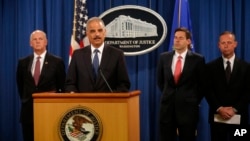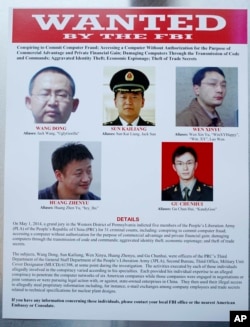A U.S. manufacturer was in the midst of a trade dispute with Asian competitors it said was flooding the market with cut-rate solar panels when it learned of a glaring new vulnerability: Its online communications were being hacked.
SolarWorld executives “were notified by the FBI that there was a penetration, and it was ongoing,” company spokesman Ben Santarris said, describing the “exfiltrations” of thousands of sensitive emails and documents.
Santarris’ dispassionate language contrasts with the anger and frustration that U.S. officials expressed this week. In a landmark case, they charged five Chinese military officers with stealing information from a handful of prominent technology companies, including SolarWorld, U.S. Steel Corp. and Westinghouse Electric Co.
While the exact toll of the alleged espionage and theft would be almost impossible to calculate, experts say, the potential costs to America’s economy could be staggering in terms of lost sales, profits and jobs.
The theft of a single company’s proprietary information about products or processes “could be worth millions, it could be billions,” said Halina Dziewit, who specializes in emerging technology as an intellectual property attorney for the Washington-based law firm Patton Boggs LLP.
“You’re losing your competitive advantage. You’re not getting the maximum return on your investment,” creating disincentives for more research and development, she said.
Overall, foreign theft of U.S. intellectual property costs “$300 billion a year and up, and that’s conservative,” said Slade Gorton, a former U.S. senator and member of the Commission on the Theft of American Intellectual Property.
Report warned about China
Last May, the commission issued a report that cited the impact of intellectual property theft by foreigners, singling out China as the most egregious offender.
The indictment announced Monday was brought by a grand jury in the Western District of Pennsylvania.
Five of the alleged six hacking victims are located in Pittsburgh: Westinghouse Electric Co., Alcoa World Alumina, Allegheny Technologies, U.S. Steel Corp. and the United Steelworkers Union. SolarWorld, a wholly owned subsidiary of SolarWorldAG in Germany, is based in Hillsboro, Ore.
China denied the accusations, lodging a protest late Monday with U.S. Ambassador Max Baucus. China’s Defense Ministry warned the indictments could harm the two countries’ ongoing discussions concerning cybersecurity and the military.
A spokesman for China’s foreign ministry, Hong Lei, denied his country ever had engaged in cybertheft of trade secrets. And China's Defense Ministry accused the United States of having "ulterior motives" and of demonstrating "hypocrisy and double standards."
FBI Director James Comey, in an interview this week with ABC News, said the United States conducted surveillance for national security purposes but never shared information with businesses, which would give them an unfair competitive edge.
For years, the United States had accused China of stealing trade secrets but hadn’t adequately substantiated its claims, said David Hickton, U.S. attorney for the Western District of Pennsylvania.
“This indictment changes that,” Hickton told VOA in an interview. “… We have given China the evidence.”
Indictment details problems
The indictment charges the Chinese with computer hacking, economic espionage and other offenses. It alleges that, from 2006 to 2012, they broke into computer systems, stealing trade secrets or other sensitive information that might benefit Chinese companies or “that would provide a competitor, or an adversary in litigation, with insight into the [organization’s] strategy and vulnerabilities,” according to a Department of Justice news release Monday.
For instance, the indictment contends the hackers stole key information about U.S. Steel’s cutting-edge stainless-steel pipes, installing malware on computers and snagging “hostnames and descriptions” of computers, “including those that controlled physical access to company facilities.” Westinghouse, while building four power plants in China, allegedly suffered the theft of “confidential and proprietary technical and design specifications” for pipes.
“There is a direct loss to the company when cyber-espionage is done,” Hickton said, “… especially when it’s done by a state actor for a state company.”
He also emphasized the “downstream losses” to ordinary Americans, particularly those employed by the named companies. They “lose their jobs because the companies they work for can’t compete,” he told VOA.
Exact accounting ‘unknowable’
The hackers allegedly stole SolarWorld information about “cash flow, manufacturing metrics, product line information, costs and privileged attorney-client communications” about ongoing trade litigation, the indictment says.
SolarWorld’s spokesman, Santarris, told VOA he couldn’t estimate the company’s related financial losses because of “too many unknowables.” Through cyber spying, he said, “unfair advantages could have been secured in a variety of directions: knowing about our cost structure, our financial position, our technological road map, our innovative ideas, our strategy for trying to curb anti-competitive trade.”
Santarris said SolarWorld had been in litigation with China over what the company believed was the “dumping” of low-cost solar panels in the United States, creating unfair competition. The U.S. Commerce Department concurred in mid-2012 – right around the time the FBI notified SolarWorld executives of ongoing hacking. “All of the personnel who were targeted for this infiltration had connections to the trade cases,” Santarris added.
SolarWorld cooperated with the FBI investigation, Santarris said.
Helping investigators collect evidence means a company can risk further exposure, said Melodi Mosley Gates, a privacy expert and an associate with Patton Boggs. She praised what she sees as increased collaboration between private companies and the government, “a critical part of improving cybersecurity.”
Gorton, of the intellectual property theft commission, said he was encouraged by the government’s indictment, which aligns with the commission’s call for more aggressive investigation and prosecution of trade-secret theft, especially involving cybersecurity, by the Justice Department and FBI.
“This kind of cybertheft will only end when the cost of doing it exceeds the benefits the Chinese get from it,” Gorton said. “That means dealing with our own domestic market [to] much more quickly seize goods that benefit from intellectual property theft, and perhaps going beyond that.”
VOA’s Mandarin Service reporters Wei Hu and Yuwen Cheng contributed to this story.
SolarWorld executives “were notified by the FBI that there was a penetration, and it was ongoing,” company spokesman Ben Santarris said, describing the “exfiltrations” of thousands of sensitive emails and documents.
Santarris’ dispassionate language contrasts with the anger and frustration that U.S. officials expressed this week. In a landmark case, they charged five Chinese military officers with stealing information from a handful of prominent technology companies, including SolarWorld, U.S. Steel Corp. and Westinghouse Electric Co.
While the exact toll of the alleged espionage and theft would be almost impossible to calculate, experts say, the potential costs to America’s economy could be staggering in terms of lost sales, profits and jobs.
The theft of a single company’s proprietary information about products or processes “could be worth millions, it could be billions,” said Halina Dziewit, who specializes in emerging technology as an intellectual property attorney for the Washington-based law firm Patton Boggs LLP.
“You’re losing your competitive advantage. You’re not getting the maximum return on your investment,” creating disincentives for more research and development, she said.
Overall, foreign theft of U.S. intellectual property costs “$300 billion a year and up, and that’s conservative,” said Slade Gorton, a former U.S. senator and member of the Commission on the Theft of American Intellectual Property.
Report warned about China
Last May, the commission issued a report that cited the impact of intellectual property theft by foreigners, singling out China as the most egregious offender.
The indictment announced Monday was brought by a grand jury in the Western District of Pennsylvania.
Five of the alleged six hacking victims are located in Pittsburgh: Westinghouse Electric Co., Alcoa World Alumina, Allegheny Technologies, U.S. Steel Corp. and the United Steelworkers Union. SolarWorld, a wholly owned subsidiary of SolarWorldAG in Germany, is based in Hillsboro, Ore.
China denied the accusations, lodging a protest late Monday with U.S. Ambassador Max Baucus. China’s Defense Ministry warned the indictments could harm the two countries’ ongoing discussions concerning cybersecurity and the military.
A spokesman for China’s foreign ministry, Hong Lei, denied his country ever had engaged in cybertheft of trade secrets. And China's Defense Ministry accused the United States of having "ulterior motives" and of demonstrating "hypocrisy and double standards."
FBI Director James Comey, in an interview this week with ABC News, said the United States conducted surveillance for national security purposes but never shared information with businesses, which would give them an unfair competitive edge.
For years, the United States had accused China of stealing trade secrets but hadn’t adequately substantiated its claims, said David Hickton, U.S. attorney for the Western District of Pennsylvania.
“This indictment changes that,” Hickton told VOA in an interview. “… We have given China the evidence.”
Indictment details problems
The indictment charges the Chinese with computer hacking, economic espionage and other offenses. It alleges that, from 2006 to 2012, they broke into computer systems, stealing trade secrets or other sensitive information that might benefit Chinese companies or “that would provide a competitor, or an adversary in litigation, with insight into the [organization’s] strategy and vulnerabilities,” according to a Department of Justice news release Monday.
For instance, the indictment contends the hackers stole key information about U.S. Steel’s cutting-edge stainless-steel pipes, installing malware on computers and snagging “hostnames and descriptions” of computers, “including those that controlled physical access to company facilities.” Westinghouse, while building four power plants in China, allegedly suffered the theft of “confidential and proprietary technical and design specifications” for pipes.
“There is a direct loss to the company when cyber-espionage is done,” Hickton said, “… especially when it’s done by a state actor for a state company.”
He also emphasized the “downstream losses” to ordinary Americans, particularly those employed by the named companies. They “lose their jobs because the companies they work for can’t compete,” he told VOA.
Exact accounting ‘unknowable’
The hackers allegedly stole SolarWorld information about “cash flow, manufacturing metrics, product line information, costs and privileged attorney-client communications” about ongoing trade litigation, the indictment says.
SolarWorld’s spokesman, Santarris, told VOA he couldn’t estimate the company’s related financial losses because of “too many unknowables.” Through cyber spying, he said, “unfair advantages could have been secured in a variety of directions: knowing about our cost structure, our financial position, our technological road map, our innovative ideas, our strategy for trying to curb anti-competitive trade.”
Santarris said SolarWorld had been in litigation with China over what the company believed was the “dumping” of low-cost solar panels in the United States, creating unfair competition. The U.S. Commerce Department concurred in mid-2012 – right around the time the FBI notified SolarWorld executives of ongoing hacking. “All of the personnel who were targeted for this infiltration had connections to the trade cases,” Santarris added.
SolarWorld cooperated with the FBI investigation, Santarris said.
Helping investigators collect evidence means a company can risk further exposure, said Melodi Mosley Gates, a privacy expert and an associate with Patton Boggs. She praised what she sees as increased collaboration between private companies and the government, “a critical part of improving cybersecurity.”
Gorton, of the intellectual property theft commission, said he was encouraged by the government’s indictment, which aligns with the commission’s call for more aggressive investigation and prosecution of trade-secret theft, especially involving cybersecurity, by the Justice Department and FBI.
“This kind of cybertheft will only end when the cost of doing it exceeds the benefits the Chinese get from it,” Gorton said. “That means dealing with our own domestic market [to] much more quickly seize goods that benefit from intellectual property theft, and perhaps going beyond that.”
VOA’s Mandarin Service reporters Wei Hu and Yuwen Cheng contributed to this story.





